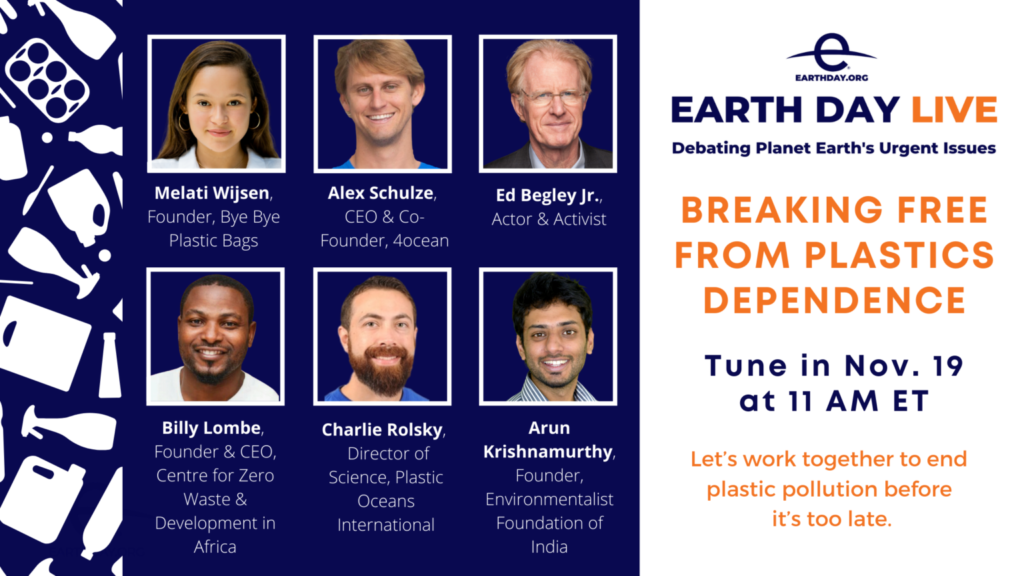End Plastics
Earth Day Live webinar to underline plastic’s most pressing issues
November 18, 2020
When you’ve finished drinking your soda and throw the bottle out in the recycling bin, do you know what happens to it next? Or when you see a plastic bag floating around in a freshwater stream being pulled out into the ocean, do you know who will end up digesting it? At the end of the day, plastics, albeit easy to make and even easier to consume, affect our environment and our lives in more ways than you can imagine.
Join us this Thursday, November 19 at 11 AM ET for Breaking Free from Plastics Dependence — an Earth Day Live webinar featuring experts working around the world to combat plastic pollution. Register for free today.

In a recent interview with EARTHDAY.ORG™, Charlie Rolsky, Director of Science for Plastic Oceans International and a panelist in the upcoming webinar, discussed the far-reaching impacts of plastic pollution.
EARTHDAY.ORG: As a scientist, what do you see as the most pressing issue with plastic pollution?
Charlie Rolsky: That’s a really good question. Right now we’re incrementally learning more and more about how bad it [plastic pollution] is, whether it’s on the macroplastic scale or the microplastic scale. And, while there might not be one single most pressing issue — I think the amount that we’re producing is to the point where once we get our heads around this and realize how bad the problem actually is, there’s just so much out there that we’re going to be literally drowning in it. At that point, when we try to remediate the problem, we’re going to be so far under how much plastic we’re producing that getting out of that situation is going to be really difficult. And even if the problem is a fraction as bad as we think it is, there’s still so much plastic out [available] that it’s going to be hugely difficult.
The chemistry of the plastic really has not changed since the 1950s. And to me, that’s probably the scariest part of it [this issue], because it’s [plastic’s] meant to last a long time. All these issues linked together are really dangerous.
EDO: What are the dangers of microplastics specifically and why should we be concerned?
CR: Microplastics are the result of either making something small intentionally or the fragmenting of larger plastics over time into really small pieces. The risks that they pose are that they’re able to penetrate virtually every ecosystem on the planet, whether it’s the bottom of the ocean or Mount Everest. Their physical makeup allows them to have a really high surface area because they were fragmented. They basically act as a vehicle for contaminants to attach at much higher concentrations than what’s found free floating in that environment.
EDO: How can scientists do better at communicating with the general public about the urgency of plastic pollution?
CR: Scientists need to be better at being uncomfortable. Scientists are comfortable in a lab, comfortable writing, comfortable going and presenting our research. What we’re not comfortable with is getting in front of a crowd and communicating, not as a scientist, but as a community member. I don’t hold scientists at fault for that. I just think that we stay in our lane too often. To be able to communicate complicated sciences is difficult, but the only way to get there is by doing it and getting better at it.
EDO: What are the projections for the dangers of plastic pollution 50 to 100 years from now?
CR: I’m sure you’ve heard that phrase, ‘By 2050, there’ll be more plastic in the ocean than fish.’ It’s tough to say for certain. We [scientists] tend to look at trends from the past 10–50 years and use that to extrapolate what’s going on in the future. On a microplastic scale, we are expecting billions and trillions of pounds on the ocean floor in certain areas. We need to figure out ways to communicate that because those numbers are a little difficult for people to wrap their heads around.
There are a lot of projections we just don’t know and that vary so much. It’s hard to track how many communities around the world are mishandling disposable plastic and how much is getting recycled.
EARTHDAY.ORG’s End Plastic Pollution campaign draws attention to the harmful effects of plastic in our environment and empowers people to make a difference. Learn more about how you can join the movement to tackle plastic pollution.
